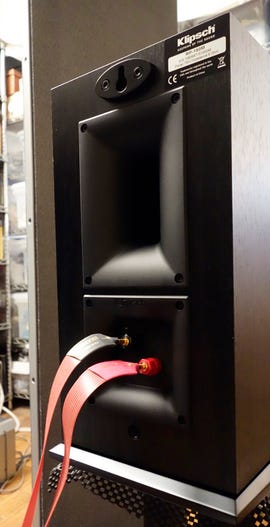It was just a few months ago that I reviewed a complete Klipsch Reference Premiere 5.1 home-theater system , but I also wanted to spend some quality time with the smallest Klipsch Reference Premiere speaker, the RP-150M monitor. Through the end of this month, the RP-150M is selling for $335 per pair with free shipping in the US, the regular MSRP is $419 per pair.
The RP-150M shares the same Klipsch 1-inch titanium “LTS” (Linear Travel Suspension) driver and Hybrid Cross-Section Tractrix horn that’s featured in all of the other Reference Premiere speakers; the RP 150M also has a “cerametallic” 5.25-inch midrange/woofer driver. ‘Round back, there’s a rather large 4.2-by-6 inch bass port that mimics the look of the tweeter’s horn. The RP-150 is 14.5 inches tall and weighs 14.7 pounds — that’s heavy for a speaker of this size. It’s available in ebony or cherrywood (vinyl) finishes, and impedance is rated at 8 ohms.

Steve Guttenberg/CNET
Turn these bad boys up, and you won’t hear them straining or distorting; they can rock out like few other speakers in the RP-150M’s size or price class. So when I played jazz sax man Steve Epstein’s “Staring at the Sun” album, drummer Jim Black’s explosive dynamics hit me hard! The sound I was getting from these little speakers took my breath away. This recording’s uncompressed dynamic range will test the stamina of any small speaker, but the RP 150Ms’ took the workout in stride. Some horn speakers can sound overly aggressive or bright, but I found the RP-150M’s treble easy on the ears. I used my NAD C316BEE integrated amplifier for most of my listening tests.
With Lucinda Williams’ “Car Wheels On A Gravel Road” album, I was struck by the sound of her vocals. She was fully present, and I was more aware of her phrasing and the way she feels about the words she’s singing than I do with most similarly priced speakers.
The RP-150M is unusually sensitive, so it can play louder at a given volume control setting on your receiver than it would with a less-sensitive speaker. The real benefit of high sensitivity is the RP-150M can do a great job with low-powered amps and receivers. To test that assumption, I hooked up the RP-150Ms to the Linear Tube Audio MicroZOTL one-watt-per-channel headphone amp (which can also play speakers)! The tiny amp sounded wonderful with the RP-150Ms, and while the speakers couldn’t play as loud as they did with the 40-watt-per-channel NAD C-316BEE, at quieter levels the speakers sounded better, clearer, and more three-dimensional with the MicroZOTL! So for anyone using a very low-power amplifier (under 30 watts) the RP-150M would be a great choice. I will do a full review of the MicroZOTL in a month — I have a lot more to say about this amazing little amp.


Steve Guttenberg/CNET
Returning to the C 316BEE amp, the increased power allowed the RP-150M to rock a lot harder, it’s a powerful-sounding little speaker, the bass prowess on electronica wizard Amon Tobin’s “Bricolage” album was tremendous, but definition was a little sloppy when I cranked the volume way up.
Sadly, I didn’t have the ELAC B6 bookshelf speakers on hand to do a direct comparison, but I think that speaker has a more refined, smoother, more accurate sound, with a flatter frequency response and better-defined bass than the RP-150M. The RP-150M counters with bigger, more forceful dynamics and improved sensitivity, so it can play louder with low-power amps, yet also handle up to 300 watts. It’s a party animal.
The Reference Premiere RP-150M is, like a lot of Klipsch speakers I’ve tested over the years, a lot of fun to listen to. Throw any genre of music at it and it will shine. Of course, the slightly larger Klipsch RP-160M monitors sound similar overall but deliver even more low-end bass thunder.




